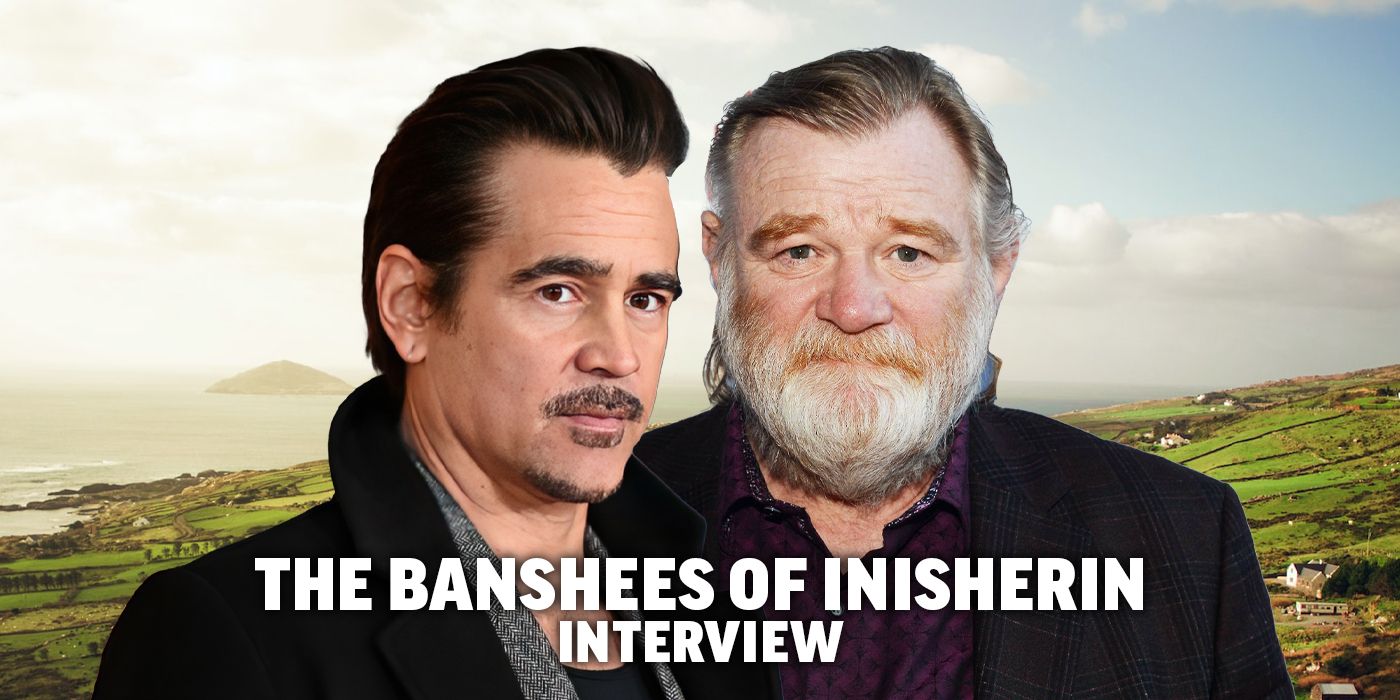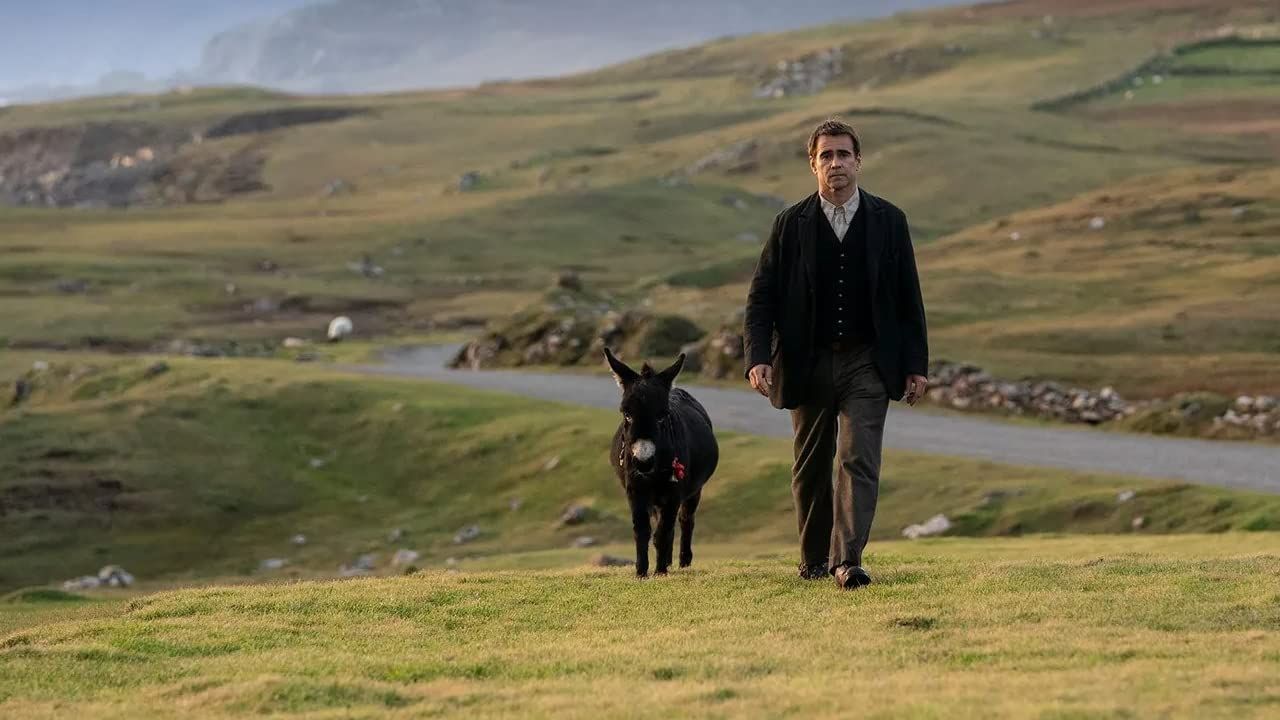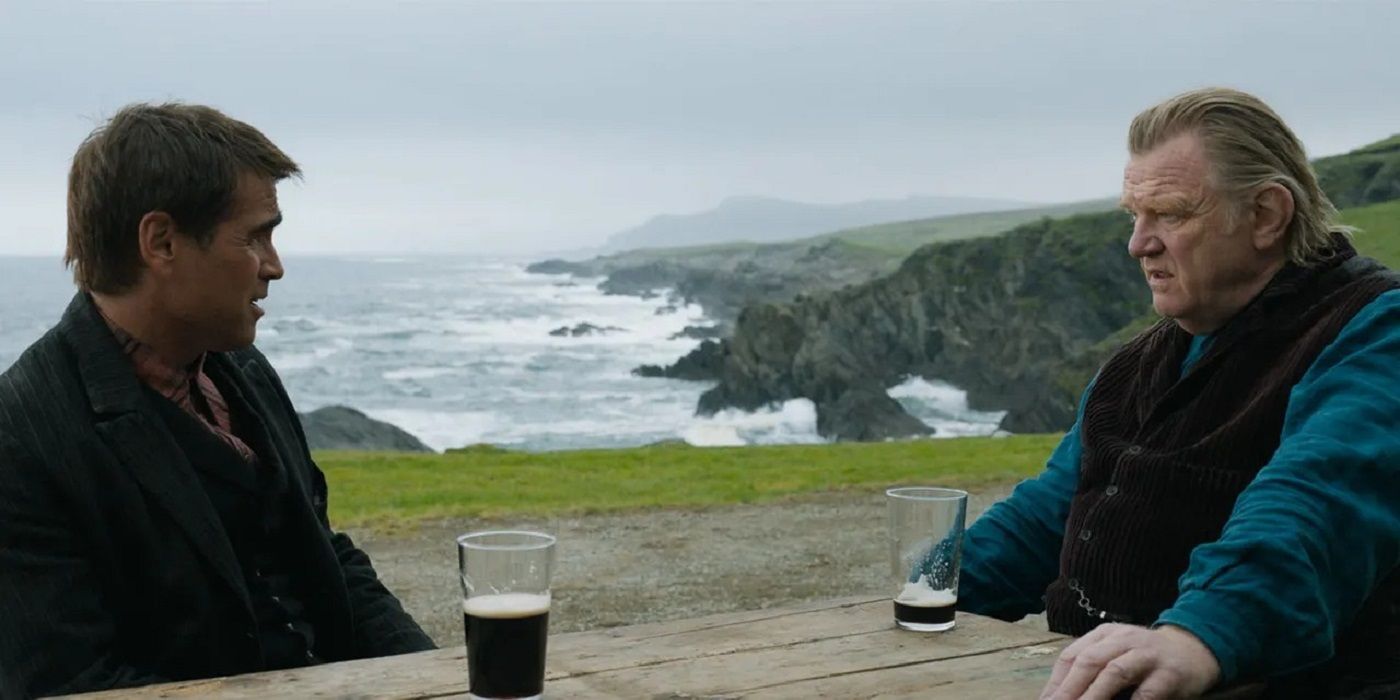One of my favorite films of 2022 is writer-director Martin McDonagh’s The Banshees of Inisherin. Loaded with fantastic performances from Colin Farrell, Brendan Gleeson, Barry Keoghan, and Kerry Condon, along a brilliant script, McDonagh’s latest work is one of those special films that doesn’t come along too often. I really can’t recommend it enough.
The Banshees of Inisherin takes place on a small island off the west coast of Ireland in the 1920’s where everyone knows everyone. It’s also the place where two lifelong friends Padraic (Farrell) and Colm (Gleeson) meet every afternoon at the local pub to talk. But when Colm suddenly puts an end to their friendship without warning, Padraic, his sister (Condon), and a troubled young man (Keoghan) attempt to repair the rift. Which leads to surprising consequences for both of them.
I recently got to speak with Colin Farrell and Brendan Gleeson to help promote the release. They talked about how McDonagh likes to direct on set, what they learned about each other and McDonagh while making In Bruges, and why making The Banshees of Inisherin in Ireland was such a special experience. In addition, Gleeson revealed his reason for signing on to Todd Phillips’ Joker sequel, and Farrell gave an update on the Penguin series that Matt Reeves is developing for HBO Max.
Watch our conversation in the player above, or you can read it below.
COLLIDER: I actually want to give both of you a sincere thank you. Way back in 2008 at Sundance when Collider was this minor nothing of a site, you guys gave me your time for In Bruges, and it meant a lot to me. Anyway, I just want to say thank you from all the way back then.
COLLIN FARRELL: When did you start up, was it the year before? Was it 2008 or 2009?
I started in 2005, but 2008 it was still a very small site compared to what we are now.
BRENDAN GLEESON: Of course.
FARRELL: And you used it well.
Yeah, it was definitely that interview that led to Collider's growth.
FARRELL: Well, we're expecting those royalties any day.
I love both of your work, and I'm just curious, if someone has never seen anything that you've done before, what is the first thing you want them watching and why?
FARRELL: Oh geez. There's no-
GLEESON: Right now In Bruges is the first thing that I'd say.
FARRELL: Yeah, I'd have to say that as well. There's an awful affection for In Bruges. The script of course, but just what that time meant to me personally and getting the chance to work at this fellow for the first time and Martin for the first time and just indelible friendships kind of created at that point. And this Banshees thing is all the sweeter and all the more meaningful because of Bruges. So Bruges would be an anchor for me.
GLEESON: Yeah, the General was the first time I worked with John Gorman, and he taught me everything. I know I'm tempted to say, but he taught me what the essential of filmmaking.
FARRELL: Your General.
GLEESON: Exactly. Yeah. But there was such a mentorship that accrued from that. There's acting and then there's film acting in a way... That to me was indelible, that process. But the collaboration that we had on In Bruges, and the challenge of the strength of the material and the place you had to go with it was complicated, especially for Col, with regard to dealing what he had to deal with. So this idea of being in, having a lot of laughs but actually been quite grim.
FARRELL: The kind of comforts that you can create so that you can actually be really uncomfortable at the center of it.
GLEESON: Yeah. Which was repeated with this, with Banshees, and just the quality of Martin's writing. Oh, it's an absolute privilege to go at it. It really special. And Banshees was delayed a little bit, COVIDized and the whole thing was like, "Oh, now it's like it was there. All of a sudden it's going to happen," and then it wasn't. And this would've been one of the ones that I would've grieved forever if that had happened.
FARRELL: If I saw somebody else do it. Now, there was a certain point in the film where, and I just told God, thank God this worked out the way it did.
GLEESON: Yeah, no, I didn't think it was going to be that somebody else would do it. I just thought that, given the times that are in it-
FARRELL: Yeah.
GLEESON: These kind of movies are increasingly difficult to get up there and get out there and really was Martin's success last year with all of that kind of thing. But we're trundling into, what I'm saying is, we're trundling into a place where it's going to be almost impossible to get these films made in the way that we got them made. This was really cinematic, deliberately cinematic, deliberately epically cinematic. And then the story was on apparently small lines, so we could get into these characters that were intimate and reduced in a way. And the whole thing was done in such a cinematic way that it's for our cinemas. It's for cinemas. And to be able to get those, we were blessed, we got it done.
FARRELL: And we had, honest to God, we had a summer that was such a kind of climatic anomaly. It was like Greece. It was like being Mykonos. I mean, we couldn't find, if we wanted to shoot in the rain, we wouldn't, we'd still be there waiting. It was unbelievable. I remember going around to the beach sometimes and taking a couple of shots at night and I took a bit of video on the iPhone of the waves, just shallow waves and coming in and lapping, and I came up with the sky was all sorts of indigoes and oranges, and it was like, "This is not any Ireland I know." But of course that's my own prejudice nearly.
GLEESON: No, it's-
FARRELL: It is based on an experience of rain and stuff. But it was-
GLEESON: I've gone to Achill twice before and didn't see it, because it was all mist and rain and stuff like that. So you're going into a place that's susceptible to it. We had one day where the weather said, "Eh-"
FARRELL: Just in case you can remember, you don't-
FARRELL: Yeah.
GLEESON: Yeah. And it blew, like we said, "Don't worry." They had the pub, it was a pub scene, it was in the pub. We said, "The intern scene would be fine, we won't have to shoot out today." The wind came along and blew all the camera, the lights from outside that, so blew them all over the place, halfway across the Atlantic. And more or less, we found it difficult to work inside because of noise and because it was very difficult to have anything. We had to block off the windows and completely seal ourselves in. So as if to say lads, I'm still here by the way.
FARRELL: It felt like the gods were smiling at us. How many times did we walk outside the club that we were shooting at-
GLEESON: Every time.
FARRELL: And we watch the sunset every day and there was no, oftentimes on films, you don't really take moments for observing the beauty around you that might be taking place in lighter way it presents itself from time to time. Here, it was so stark, it was so blinding. There was no first AD going, "Come on guys, we got to get back to work." Production shut down without it being declared. We all walked outside the pub and I had pictures on the iPhone of 40, 50 of us looking just towards the horizon. That was most days that we shot in the pub. It was just magic-
GLEESON: And between takes.
FERRELL Double rainbows!
GLEESON: Yeah, we walk out and just look up along the beauty of Achill Island up along the coast, that western coast with the black rocks and seas coming in, just even between takes. You go in there-
FARRELL: Plug yourself in.
GLEESON: Just plug yourself in. And it just contextualized everything. And also was vaguely sort of replenished it for the next take. You didn't have to even think about.
I love the movie and I think that kind of all that energy and all that feeling definitely ended up on screen. I have to ask you though, because I'm such a fan of Martin's work, what is he like in between takes when he's giving you a note or direction on what he would like in the scene? Is it just like a word or two or is it more like a full on conversation?
FARRELL: Shockingly detailed. Steve really, he really is. I mean I noticed that, I think because maybe I had a little bit of a greater degree of objectivity just, which is not to say certainty, but, well I'm 14, 15 years older now, so maybe I'm a little bit more in myself. But I could observe while being a subject to the experience, I felt I could observe Martin's process more clearly than I ever had before in a lovely way. And I just observed him being so detail oriented, and sometimes it is a word. He felt to me, he was looser this time around as well. He wasn't as, because sometimes he really, and he deserves the right to be because he hears it. He's writing music, he's not just writing dialogue. There's a musicality to what he writes as well. There's tone, there's pitch, there's pace. All those things factor in as he hears a pen to paper.
But he's very detailed. He also great laugh. He does having a great laugh. But if you look at in between takes, sometimes the brow will be furrowed and he'll have his little pencil and paper there and he'll be on top of you, and it's great stuff and open for a good argument as well. It's really, it's kind of an ideal situation in what you dream of as an actor to go to work in as part of a collaborative team. It really is all of us involved.
GLEESON: I found in terms of, it began to emerge a kind of pattern with this one in particular, much more so than In Bruges, that I had a really sort a good idea where I wanted to go with his guy and with the guy who was playing. And so you'd move in, and you'd give it and to me it worked. That's who he is. That's how the interaction seemed to work. And Martin would take. He'd say, "Okay, would you just go and try it, try it, try it." And he'd started moving you away from it, and you'd be getting further and further away. And I began to get a little distressed because I said, "This is going to turn into a different person. I'm not sure where. I need to rationalize who and how this is possible for this guy to come out some of this stuff." But you'd find we'd work through it and then bit by bit you would try it of course. Because he is what he is. And he was editing in his head and trying different variations on a theme. But I was saying, Well, if I move into this other place, I don't recognize the guy. And it basically was a question that we both talked about it.
We know this is the guy to trust, but what there's kind of a pattern I'd began to notice that it also we had to move back into that place. You would end up not too far away from where it started. So again I've got all these colors in between. But I didn't feel by the end of it that I'd been dragged out of shape. I didn't at all feel I'd been dragged. And it was a question that he'd be looking for a little nugget coming from a different place that he could use on maybe one line, but not necessarily with the others. So the possibilities he allowed for. So he had a definite idea, which is the way he was with In Bruges. But then he would throw in a whole pile of curve balls that would sort make it some-
FARRELL: He was looser, it was more... Yeah, no, absolutely. Yeah.
GLEESON: Basically what we have to do is relinquish control.
Brendan, real quick, I have to ask you, I'm a big fan of Todd Phillips and what he did on Joker. I know that you signed on for the sequel. What was it about the material that said, "I want be in this movie?"
GLEESON: It wasn't the material, which is a great way to get me out of having to answer any questions about the criteria. It was the achievement of the first film. I worked with Joaquin before on The Village.
FARRELL: Oh yeah, yeah.
GLEESON: And so I knew him from then. And that performance, I'm still in awe of it. That performance as Joker, in that first movie. It was one of the most extraordinary achievements I've ever had. And for Todd to have-
FARRELL: Amazing.
GLEESON: Worked the movie around to allow for that, I didn't have to be asked twice. I really didn't.
And Colin, real quick, is the Penguin series going to happen?
FARRELL: No idea what the Joker is about. I haven't read the script. Penguin? Shooting here in New York. I think if it goes ahead, I read the first episode, which is just so tasty and so unusual as the character was on the page and what Matt Reeves kind of envisioned when he was thinking of this iteration of the bang up of Oz. So yeah, it'll be, I think six or eight hours. I'm supposed to read episode two and three within the next week. And just a really good company of people. And Matt Reeves is all over it. And sure Matt is borderline OCD when it comes to his focus and trying to do something new and original and with feeling and aesthetic and all that good stuff. So it would be, I would love, I had such a blast doing that, Steve.
GLEESON: It was amazing.
FARRELL: It was just so much fun. It was just unbridled. I had so much permission to just do whatever.


.jpg)
.jpg)

